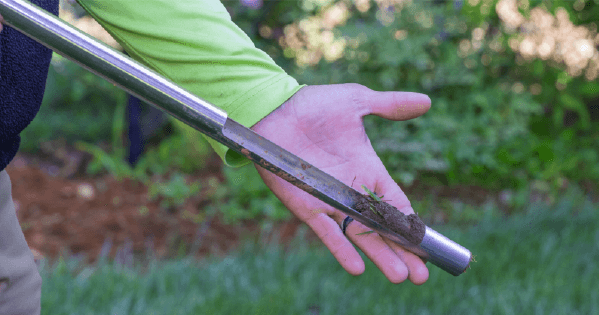Tired of Weeds Taking Over? Here’s How to Keep Your Georgia Lawn Beautiful

If you’ve worked hard to create a beautifully lush lawn, you know how frustrating it can be when weeds pop up. Unfortunately, Georgia’s warm and humid climate makes it ideal for many types of common lawn weeds to thrive.
With a little diligence and consistency, however, weeds can be kept under control through proper mowing, watering, fertilizing, and applying pre- or post-emergent herbicides. Hand-pulling is a good method to get rid of weeds, too, as long as you dig up all the roots.
Most Common Lawn Weeds in Georgia
Below are the names of the most common weeds found in Georgia lawns:
- Crabgrass – Ugly and tenacious, crabgrass grows well in sunny areas and spreads quickly during the warm seasons. Crabgrass is a summer annual that can outcompete turfgrass if left unchecked. It is so hardy that it pops up through cracks in driveways, sidewalks and even between bricks.
- Dandelions – Disguised with a pretty yellow flower, dandelion is another stubborn, common lawn weed that can multiply quickly. It’s a perennial with a deep taproot that needs to be excavated before its yellow flowerhead turns into a cluster of white, billowy seeds barely attached to the receptacle. Wind blows the seed from the plant throughout the yard. Each dandelion can produce between 150 and 400 seeds, so it’s important to dig it out from the root or use a post-emergent herbicide.
- Clover – Clover produces purple or white flowers, which makes it pretty cute for a weed, but unfortunately it can wreak havoc on your lawn. This is another very common lawn weed that can take over your yard quickly. This perennial weed grows in patches and often indicates nitrogen-deficient soil. Although clover has benefits, such as providing a sweet nectar for bees, it can flower from June through September and stays green in fall and winter. It can flower several times in a growing season and shed new seeds every month. So, be careful when mowing over clover in bloom.
- Annual Bluegrass (Poa annua) – This cool-season grass is considered a common lawn weed in most lawns and landscapes. While it can blend into some lawns, it tends to create an uneven appearance. In Georgia’s warmer climate, annual bluegrass is a common nuisance weed that reseeds itself, so it can spread quickly and inconspicuously.
- Yellow Nutsedge – At first, yellow nutsedge appears as grass, but before long, it will bear unsightly yellow or brown seedheads that will infest your Georgia lawn. Yellow nutsedge reproduces through seeds, creeping rhizomes and tubers, making it a very effective invasive plant. Aboveground parts of yellow nutsedge will die off after a frost, but tubers, which survive underground, will produce new plants in the spring.
- Spurge – Spurge is a low-growing, mat-forming weed that also spreads quickly. It produces milky sap when broken. Spurge produces small, inconspicuous flowers producing a large number of seeds. Seeds are spread close to the parent plant, but also can be carried by wind, water, lawn equipment, humans and animals.
- Chickweed – This winter annual prefers moist, shady areas and grows in clumps. When its small, white flowers bloom in late winter or early spring, it’s not long before seeds begin to spread. Early detection and extraction are key to keeping chickweed from taking over your Georgia lawn.
- Henbit – If Henbit is a habit in your lawn, post-emergent herbicides may be the best option for eradicating it. This common annual broadleaf weed spreads by seed and germinates in either fall or winter. Its sideways growth pattern makes it difficult to mow down.
How Do I Get Rid of Common Weeds in My Georgia Lawn?
To keep your lawn free of common weeds, apply a pre-emergent herbicide. This will prevent the weeds from growing into mature plants. Pre-emergent herbicides must be applied at just the right time – before weed seeds germinate. Since certain weeds germinate in the warm seasons, and others in the cold seasons, it’s best to consult a professional for correct application.
Post-emergent herbicides are best to use when these common lawn weeds are visible in your Georgia lawn and garden. Post-emergent herbicides are absorbed into the weed, but timing of applications is important. Know the type of weeds you are dealing with and consult a knowledgeable professional for the best results. Once weeds are apparent, there are many things to consider – type, temperature, and growth stage. Monitor your lawn regularly for signs common weeds could become a problem.
Simply Green Can Help Remove Common Lawn Weeds
The best way to fight weeds is through professional intervention. Simply Green Lawn Care Plus offers lawn care services specific to a Georgia homeowner’s needs. Expert lawn care services are designed to prevent weeds through application of pre-emergent and post-emergent herbicides. Lawn technicians also advise on best practices for lawn maintenance in Georgia’s climate.
Contact Simply Green today to begin weeding out these pesky lawn invaders.
About Simply Green Lawn Care

Simply Green aims to provide the highest quality lawn care, mosquito control, and lawn pest control services to Georgia residents.
We are locally owned and operated which allows us to be accessible, attentive, and responsive for customers in Georgia.
Our well-trained team is easy to work with and determined to exceed expectations.
All our plant health care specialists are Georgia Department of Agriculture Certified and maintain their Category 24 applicators license.

